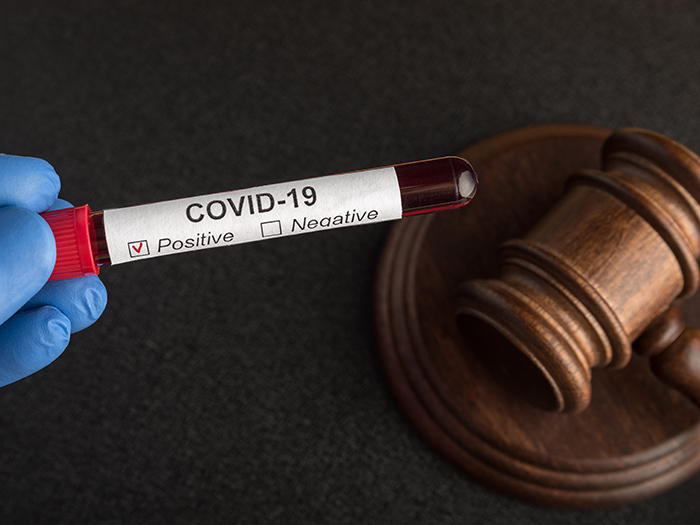COVID-19 and Workers’ Comp: What Current Court Cases Could Mean for the Industry

When the novel coronavirus first arrived in the United States, businesses and their insurers began bracing themselves for losses.
Businesses have since sued their insurance companies after their business interruption claims were denied and, on the workers’ compensation end, employers have been facing lawsuits from employees alleging that public health guidelines were not adhered to.
A new NCCI report compiles some recent COVID-19 workers’ comp lawsuits. Here are the five cases they identified and the key lessons to take away for employers.
COVID-19 Workers’ Comp Lawsuits
1) Illinois Manufacturers’ Association v. Illinois Workers’ Compensation Commission: Filed in April, this case is one of the first related to the COVID-19 pandemic.
In this case, a circuit court judge blocked an emergency amendment to the Illinois Workers’ Compensation Act that would have granted a presumption to any essential worker who contracted COVID-19, even if they got the disease while working from home.
This temporary restraining order was issued following a lawsuit filed by the Illinois Manufacturers’ Association and the Illinois Retail Merchants Association against emergency amendments adopted by the Illinois Workers’ Compensation Commission. The suit was supported by more than two dozen business groups.
After the court’s decision, the Workers’ Compensation Commission withdrew the emergency amendment and by the end of April a motion to dismiss the temporary restraining order was filed. The state has since passed a different workers’ comp presumption law for workers who contract COVID-19.
2) Evans v. Walmart, Inc.: The family of a Walmart employee who died due to complications from COVID-19 is suing the corporation for negligence and recklessness. The plaintiff’s attorneys say that this is Illinois first wrongful death suit related to the pandemic.
The suit, which was filed in April, alleges that “several employees and individuals at the store were exhibiting signs and symptoms of the virus,” and that another employee also died of COVID-19 complications just a few days later, Bloomberg Law reports.
Evergreen LLC, which allegedly owned, managed, and maintained the shopping center where the store is located, is also named as a defendant in the lawsuit. The plaintiff is seeking over $50,000 plus legal expenses.
Walmart filed a motion to dismiss on June 25 on the grounds that the lawsuit is barred by the exclusive remedy provision of the Illinois Workers’ Compensation Act.
3) Benjamin v. JBS: In this case filed in May, the estate of a Pennsylvania meat processing plant worker is suing JBS, the world’s largest processor of fresh beef and pork, for negligence and gross negligence.
The suit alleges that the company ignored the risk of COVID-19 to its employees and failed to provide them with proper personal protective equipment.
Pursuing the suit is the estate of a worker who also served as a union representative and died after contracting COVID-19.
In June, the company filed a motion to dismiss, claiming that the exclusive remedy provision in the Pennsylvania Workers’ Compensation Act bars the employee’s complaints.
4) Massey v. McDonald’s Corporation: Fast-food giant McDonald’s faces a lawsuit from a group of Chicago workers over whether the company adhered to expert recommendations and government guidance on how to best protect workers and the public from the spread of COVID-19.
In May, the workers filed a lawsuit claiming that the company’s inadequate COVID-19 safeguards constituted a public nuisance.
In June, the court entered a preliminary injunction which required McDonald’s to provide social-distance training and to enforce mask wearing policies.
5) Palmer v. Amazon.com Inc.: The most recently filed case, Palmer v. Amazon.com Inc. alleges that Amazon failed to comply with local, state and federal public health guidelines during the pandemic and thus caused injury and death to the employees and their families.
Filed by three Staten Island warehouse workers in June, the suit questions the company’s efforts to track and trace the spread of the virus among workers, with one worker alleging that he was told to come in to work, even though he had come in contact with a supervisor who tested positive for the virus, CNBC reports.
Rather than seek monetary relief, the plaintiffs are asking for an injunction that would require Amazon to comply with public health guidelines and an order that would declare the company a public nuisance.
Takeaways
While these cases are still pending, they can give companies an idea of the kind of behavior and policies that may lead a worker to sue during the COVID-19 pandemic.
Many of the COVID-19 workers’ comp lawsuits are threaded together by the common theme of employee safety. Workers are alleging their employers failed to adhere to public health guidelines and thus put the employees at risk of sickness or death.
Given this common theme, the best way for employers to protect themselves from litigation may be to enforce public health guidelines, including mask-wearing and social distancing for all of their employees, even if the states they live in don’t yet require those measures.
In many of these cases, it’s too early to tell where the courts’ and juries’ sympathies will lie, but given the recent trend toward nuclear verdicts and the public’s knowledge of the devastating effects of COVID-19, it would be reasonable for employers to fear substantial jury awards in these lawsuits go to trial. &










